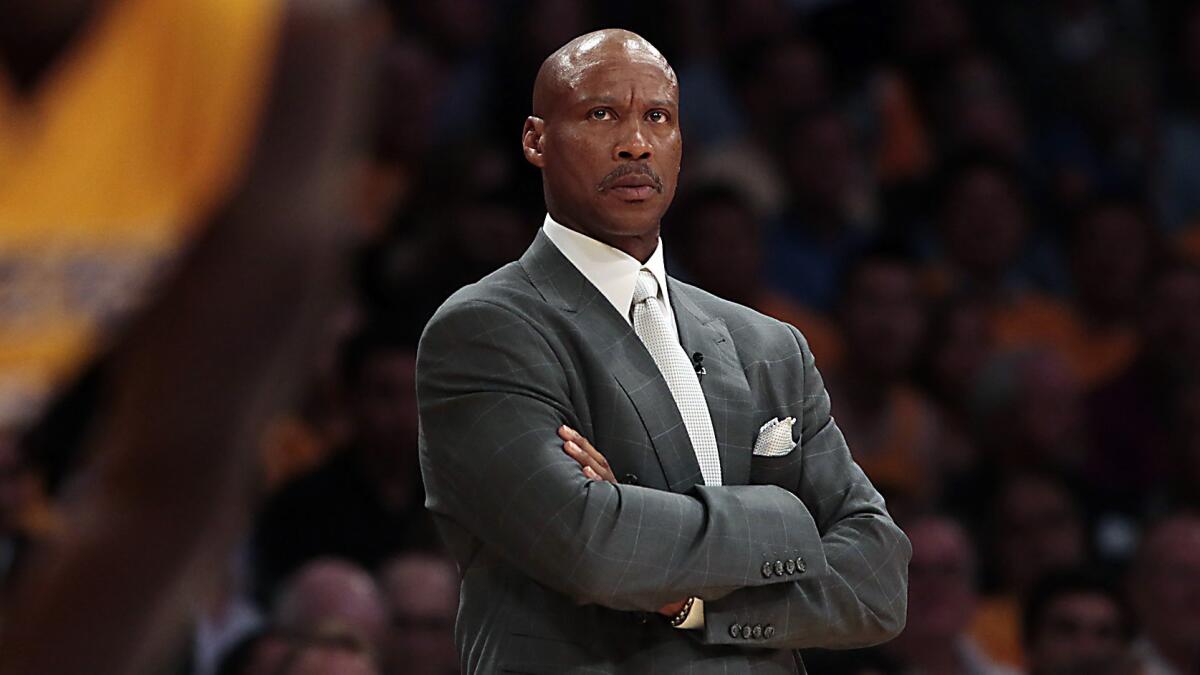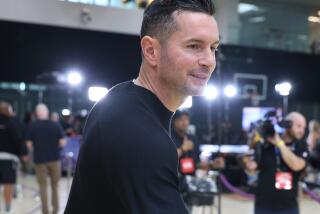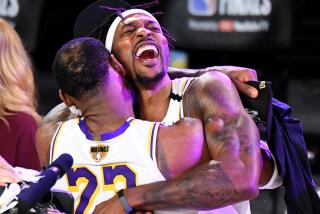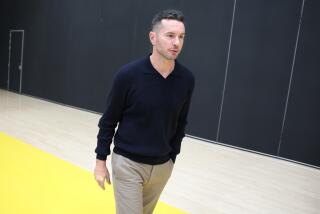Jim Buss defends Coach Byron Scott and the Lakers’ use of analytics

- Share via
A popular topic in NBA circles is analytics, which involve studying advanced statistics to gain an advantage on the basketball court.
In February, Lakers Coach Byron Scott downplayed his use of analytics but has since gone on record, via radio on The Beast 980, that he’ll “use analytics a lot more” this season.
On Thursday, Lakers part-owner and executive vice president of basketball operations Jim Buss told The Times, “We’ve been using them for quite a long time. That’s basically [on] what I make all my decisions, is my own analytics.”
Buss said the team has relied on an analytics staff for “six [or] seven years, but before that we were breaking down shot charts, everything we could get our hands on.”
To the notion the Lakers are behind the times, Buss simply disagrees.
“It’s an unfair assessment,” he said. “We don’t announce what we do ... if we are ahead of the game why would we tell people what we’re doing, so that they can catch up?”
Obviously the Lakers don’t look like a franchise ahead of the game, given the team’s 48 wins in total over the past two seasons.
“The reason that we’ve hit an extra bottom was because of injuries,” said Buss. “We lost Steve Nash, which is going to go down as a bad trade, but we would have done it again. He was a two-time MVP and we felt he still had some time.”
The Lakers lost players to injury for more games than any other franchise last season, and they faced a similar fate through the 2013-14 season.
All-Star Kobe Bryant tore an Achilles’ tendon in 2013, followed by a fractured knee the next season and a torn rotator cuff in his shoulder in January.
The team has also suffered through a sizable talent gap in the Western Conference.
“We’re rebuilding and there a lot of components that have caused us to lose the games that we have,” he said.
Buss is confident that the team has turned a corner with players such as Jordan Clarkson, Julius Randle, D’Angelo Russell and Roy Hibbert. He’s also a strong believer in Scott.
“Having that history of the Lakers from the very beginning of when [the Buss family] bought the team, gives you such a family sense. He’s a coach, a brother,” said Buss. “He gets it. He’s a strong personality. He believes in himself and the Lakers.”
One of the big questions for the coming season is Bryant’s role. How many minutes can the 38-year-old veteran play?
“[Bryant] and Byron talk daily,” said Buss, deferring the answer to the team’s coach. “I think they’ve got a game plan of how they’re going to handle it.”
Scott, 54, has called himself “old school,” but Buss is confident that his coach will be open to changing with the times, especially analytically.
“You can call him ‘old school,’ but what is he 50? He’s very flexible” said Buss. “He gets all the analytical parts of it, he’s not set in his ways. If he sees something that’s going to improve the team, he’s going to do it.”
Buss focuses on the numbers when he’s investigating possible targets for the team, but he relies heavily on the wisdom of General Manager Mitch Kupchak, along with the input of Scott, when putting together a roster.
“There are parameters that I need to see on a guy but that doesn’t mean he fits the team. That’s where Mitch comes in, he knows the numbers, but he also sees if he’s a fit,” said Buss. “Then you go to Byron Scott, is this a guy that you like? Is this a guy that fits the team, does he complement the other players?
“Analytics doesn’t really get to that human detail of, ‘Does he fit with this guy?’ Percentage-wise and stat-wise he does, but you have personalities, style of play, coaches that have a style of play and you have to put that all together.
“If I don’t like a guy statistically or analytically then I might come in and say I’m not in favor of this. If he passes my test, then I just let [Kupchak and Scott] figure out who is the better fit.”
Buss spoke of free-agent guard J.R. Smith, who recently declared his intention to re-sign with the Cleveland Cavaliers, as a very different fit analytically with the Cavaliers than he was in an inconsistent stint with the New York Knicks.
“He didn’t just become great because he went to the Cleveland Cavaliers, he is a good player,” said Buss. “That’s the human element, where does he fit? How does he fit? That’s why you see the difference between him in New York and him in Cleveland.”
From an analytic perspective, the Lakers’ acquired a defensive prize in Hibbert, acquired via trade from the Indiana Pacers.
“He’s a stopper,” said Buss. “We’ve got a guy who can protect the rim.”
A former two-time All-Star, Hibbert will earn $15.6 million in the final year of his contract.
“It’s a perfect fit for us, especially with the flexibility it saves us,” said Buss, who is looking at the $50 million to $60 million the Lakers could have in cap room next summer.
The Lakers absorbed Hibbert into their cap room in July, giving up just a 2019 second-round pick in a trade the team had lined up with the Indiana Pacers before they tried the free-agent market for bigger names like DeAndre Jordan and LaMarcus Aldridge.
“We had him locked up,” said Buss. “Larry Bird, [Pacers president of basketball operations], is a man of his word, and he basically said he we have a deal ... It was contingent on [the Lakers not signing a big dollar free agent].”
“He was fine with that,” he continued. “Bird wanted to put the kid into a spotlight like this.”
In addition to his own number crunching, Buss said he learned a number of valuable lessons from the team’s former general manager Jerry West.
“There are two [specific] things that are so incredibly accurate, that I feel like I have an advantage because of Jerry West,” said Buss, refusing to share the details.
Buss called West one of his heroes. “His knowledge continues through to this day, now we have his son, [Ryan West].”
Ryan West, who joined the Lakers in 2009, was recently promoted to director of player personnel.
“I would say he has a different approach than his dad, but his work ethic and the drive is there,” said Buss. “He’s straight from Jerry, 100%. Give him 20 years, he probably will turn into Jerry.”
“Having Ryan in there, he doesn’t replace his dad as I don’t replace my dad [Jerry Buss who passed away in 2013], but at the same time, you get that he’s a Laker at heart,” he continued. “You know that he bleeds purple. You don’t have to question anything about the guy, he’s 100% dedicated to the Lakers. So am I, so is Mitch, so are our scouts. It gives a very comfortable feeling that you can concentrate on basketball when you have this kind of family around you.”
Buss, who shares the majority ownership of the Lakers with his five siblings, said the Lakers’ franchise is not on the market.
“There is no point to sell, because it’s a family business,” he said. “We have Jesse [Buss] who runs the scouting and does an incredible job. Joey [Buss], who is the business side and runs the D-Fenders and does a great job. They’re the future of the Lakers.
“We’re not going to sell, that’s all there is to it.”
Email Eric Pincus at [email protected] and follow him on Twitter @EricPincus.
More to Read
All things Lakers, all the time.
Get all the Lakers news you need in Dan Woike's weekly newsletter.
You may occasionally receive promotional content from the Los Angeles Times.






